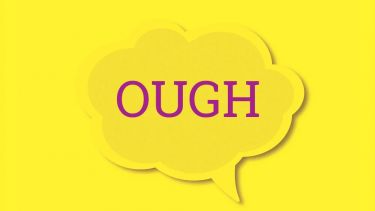ɪnᴧf about 'ough'
Curious me always wondered what the deal was with all these random silent letters in English and why there were so many sounds a letter could be, not to mention the number of letters than can make a sound.
The letters b, l, n, and k are just a few that can add nothing whatsoever to the sound or meaning of a word. Urgh. Or rather, ough – how does anyone even pronounce that?
Studying linguistics made it all the more apparent some of the reasons why, but English itself is essentially inadequate in describing how something sounds in relation to its written system (its orthography) because you have to take into account intonation and accents as well, which the alphabet cannot really do. But there is a way us linguists use which is a nifty, not-so-little alphabet of all the sounds possible within human speech. From every language and dialect. From every inhabited continent and country. Every. Last. Sound.
One boring morning during lockdown I decided to elaborate on this concept of English being a bad language to spell in as it infuriated me. Or is that mee, or mey, or meeeee… Who knows? The International Phonetic Alphabet helps eliminate this ambiguity to focus on the sounds in question. So, with levels hitting maximum for boredom, irksomeness, and confusion for that supposedly new word ‘furlough’, I took pen to paper – or hand to keyboard – in a bid to vent in poetic form. I introduce my poem ‘Inuff about Ough’ to anyone who desires to preach the need for a phonetic alphabet, for all who wish to spell with a little more ease and for everyone to simply ponder about and enjoy.
Inuff about Ough
The dialects of Britain can be quite tough
With weirdly spelt words like the ending in rough
Why is it that the sound ‘ough’ in enough
Is not spelt like ‘uff’ in cuff or puff?
Who said it should be that ‘ought’ in thought
Is spoken the same as in short and taught?
Why is the ‘ough’ in drought or plough
Unlike the ‘ow’ and now and cow?
How can it have unique cases too
Like ‘ough’ in hiccough, but differently in through?
We now write ‘up’, should we not write ‘oo’?
Though we could write it as in true or shoe.
Who said it can’t be colough not colour
When that is closer to thorough and borough?
There’s another in Irish and one in Scottish
Muddying our spelling into gibberish;
The ‘ough’ and the ‘ough’ in lough and in clough –
One has been fixed but the other has not
Although the ‘ough’ in furlough and dough
Are not like no, nor bow and toe,
The simpler spellings have versions abound
Even though they’re all the same sound
Why is this language so unable to spell?
How can we reverse this ‘spelling’ hell?
Well thankfully there is already a way
Linguists know it as the IPA.
One way to spell things – no need to decide,
No strange spellings with other sounds inside.
With ‘och’, ‘ock’ and ‘u’, then ‘uff’, ‘up’ and ‘oo’,
There’s ‘ow’, ‘oh’ and ‘or’, with one left to doo,
We left ‘off’ to the end as in cough and trough
Because English spelling can go and ghiss ough!
I hope that now people see what an illogical system this really is. And ough yes; here is the list of pronunciations of our strange friend ‘ough’. Even native speakers sometimes struggle, let alone speakers to whom it is not their primary language. Words in brackets are the IPA transcriptions of the word’s pronunciation.
- /ɒx/ or ‘och’ in Lough /lɒx/ (Archaic Scoottish)
- /ɒk/ or ‘ock’ in Clough /klɒk/, Hough /hɒk/ (Irish & Archaic English since amended)
- /ə/ or ‘u’ in Thorough /θəɹə/
- /ᴧf/ or ‘uff’ in Enough /ɪnᴧf/
- /ᴧp/ or ‘up’ in Hiccough /hɪkᴧp/ (Archaic English since amended)
- /uː/ or ‘oo’ in Through /θɹuː/
- /əʊ/ or ‘oh’ in Dough /dəʊ/
- /aʊ/ or ‘ow’ in Plough /plaʊ/
- /ɔː/ or ‘or’ in Thought /θɔːt/
- /ɒf/ or ‘off’ in Trough /tɹɒf/
Yes – a mess. No wonder we were all confused when furlough became a new lockdown buzzword.
Written by DP, Digital Student Ambassador.

International undergraduate scholarships
We are offering scholarships of £2,500 for each year (subject to a 60% average) of your undergraduate degree. The maximum value is £10,000 for four-year programmes.

